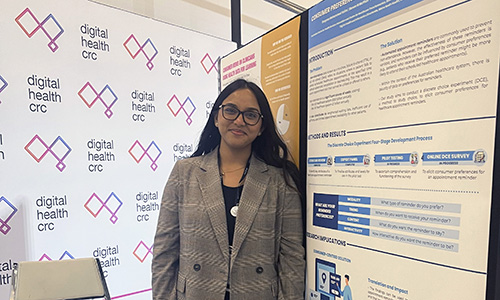Addressing patient non-attendance with digital health solutions
By Shayma Mohammed Selim, AusHSI PhD Scholar

When I began my Digital Health CRC-supported PhD journey four years ago, I was motivated by a desire to help address a widespread healthcare system problem: patient non-attendance at outpatient healthcare appointments. High rates of non-attendance can have ripple effects on healthcare systems not only in Australia, but across the world; in the United States, non-attendance has been estimated to cost US$150 billion per year. It contributes to long waiting lists, wasted resources, and delayed access to care which, in turn, can negatively affect patient outcomes and overall system efficiency.
With the increasing digitisation of healthcare systems, I was curious: could digital health offer innovative and effective solutions to address this problem?
Through my research, I found that digital health holds tremendous potential, but also faces significant challenges. There are many reasons why patients may not be able to attend an appointment, and this complexity means there is no single “silver bullet” or one-size-fits-all solution. For example, no one technology can entirely address systemic issues such as transportation difficulties or inconvenient scheduling.
Nevertheless, thoughtfully designed digital health solutions can improve healthcare efficiency, cost effectiveness and accessibility. Tools such as appointment reminders, telehealth appointments, and user-friendly systems for rescheduling or cancelling appointments have emerged as some examples of promising strategies.
The focus on digital health informed the structure of my research, which ultimately included four interconnected studies:
- A scoping review that identified existing digital health solutions for reducing non-attendance.
- A time-driven activity-based costing study that quantified the impact of non-attendance at a large metropolitan health service using workflow mapping and cost-simulation.
- A qualitative study that explored clinical and administrative staff experiences surrounding non-attendance and perceptions of current and prospective digital health strategies.
- A discrete choice experiment that elicited consumer preferences for a healthcare appointment reminder in Australia.
Each of these studies deepened my understanding of the problem and highlighted the nuances of finding appropriate and suitable digital health solutions. I learned that equity and accessibility are among the key considerations that one must keep in mind when thinking about the potential of any technological intervention. For example, reminders or telehealth must accommodate diverse patient populations, including those with limited digital literacy or internet access.
Of course, the journey to thesis submission was not without its challenges. From delays in getting ethics clearance, to participant recruitment struggles, there were many moments when things didn’t go to plan. Yet, these setbacks served as opportunities for me to grow – it taught me to be resilient, adaptable, and to collaborate. I also learned to pivot when necessary, critically assess my methods, and embrace the never-ending landscape of uncertainty – a hallmark of most PhD experiences.
Looking back, I am incredibly grateful for the opportunities this research has provided. Having had the opportunity to meet, learn, and work alongside researchers working at the intersection of healthcare delivery and digital health has been incredibly rewarding. I’m also left with the sentiment that while technology alone won’t solve the problem of non-attendance, it has the potential to transform how we deliver care—making systems more efficient, effective, and patient-centred.
This doctoral research program was made possible by the Digital Health Cooperative Research Centree (DHCRC). It was conducted in partnership with QUT, the Australian Centre for Health Services and Innovation and Metro South Health.
As a partnering member of the DHCRC, AusHSI manages several research projects in the area of digital disruption in health environments. Hear Shay talk about her PhD research on patient non-attendance with Peter Birch in this Talking HealthTech episode (10:38 min).







